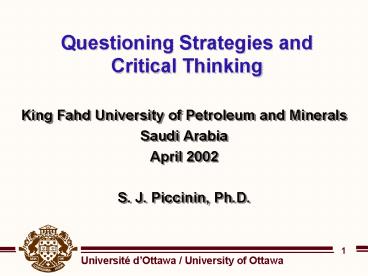Questioning Strategies and Critical Thinking - PowerPoint PPT Presentation
1 / 14
Title:
Questioning Strategies and Critical Thinking
Description:
Explore relationships to critical thinking. Universit d'Ottawa / University of Ottawa ... Critical Thinking. Items rated highly ... – PowerPoint PPT presentation
Number of Views:119
Avg rating:3.0/5.0
Title: Questioning Strategies and Critical Thinking
1
Questioning Strategies andCritical Thinking
- King Fahd University of Petroleum and Minerals
- Saudi Arabia
- April 2002
- S. J. Piccinin, Ph.D.
2
Objectives
- Describe a classification of questions
- Explain structure and characteristics of better
questions - Identify common errors so as to improve
questioning - Practice writing questions
- Explore relationships to critical thinking
3
Some Thoughts on Questions
- "The whole of teaching and learning is shot
through with the art of questioning." - Hamilton (1928)
4
Some Thoughts on Questions
- "What's in a question, you ask?
- Everything. It is the way of evoking stimulating
response or stultifying inquiry. It is, in
essence, the very core of teaching." - John Dewey (1933).
- How we Think. Boston, D.C. Heath
5
Some Thoughts on Questions
- The question to a wise man is the beginning of
wisdom - German Proverb
6
Some Thoughts on Questions
- Isadore Rabbi suggests he became a good
physicist and won the Nobel Prize because he was
valued more for the questions he was asking than
for the answers he was giving.
7
Some Thoughts on Questions
- "The art of questioning is the art of guiding
learning." - J. Green (1996). Editors note, Clearing House,
40, p.397.
8
Critical ThinkingA Definition
- " ability to judge the relative merits of
conflicting evidence on the basis of sound
conceptual frameworks and to make decisions and
to act upon best evidence."
9
Critical Thinking
- Items rated highly
- Reasoning or problem solving in situations in
which all the needed information is not known - Detecting fallacies and logical contradictions in
arguments - Recognizing similarities between one type of
problem or theory and another - Power Enright (1987)
10
Differences Among Disciplines
- The importance of particular reasoning skills
- The seriousness with which faculty regard
particular reasoning errors - The impact that various critical incidents have
on faculty member's estimation of students'
analytical abilities - Power Enright (1987)
11
Result of Factor Analysis of 56 Critical Thinking
Skills Important for Success in Each of the Six
Disciplines
- Analysis and evaluation of arguments
- Drawing of inferences and development of
conclusions - Definition and analysis of problems
- Ability to reason inductively
- Generating alternative explanations
- Power Enright (1987)
12
Most Serious "Flaws" in Reasoning in All
Disciplines
- Accepting the central assumptions in an argument
without questioning them - Being unable to integrate and synthesize ideas
from various sources - Being unable to generate hypotheses independently
- Power Enright (1987)
13
Other Reasoning Errors
- Making generalizations from insufficient evidence
- Confusing coincidence with causation
- Offering irrelevant statements
- Applying rules without justification
- Inability to see a pattern
- Ignoring details
- Power Enright (1987)
14
Factor Analysis of Errors Two Factors
- Errors in evaluation of evidence
- Formal logic errors, particularly when reasoning
with statistically oriented material - Power Enright (1987)































